Books for Review
 Education in Spite of Policy
Education in Spite of Policy
Author: Robin Alexander
Published: 2022
Publisher: Routledge
In Education in Spite of Policy, Robin Alexander offers a critique of England’s national curriculum, exposing its narrowing vision and its troubling disregard for both research and professional expertise. At the heart of the book lies a powerful argument for dialogic teaching, which he argues is a democratic necessity in an age of misinformation and “post-truth.” Drawing on decades of experience and over 600 sources, Alexander shows how meaningful classroom talk can resist the corrosion of civic discourse and reclaim education as a public good.
 The Spirit of Carnival: Magical Realism and the Grotesque
The Spirit of Carnival: Magical Realism and the Grotesque
Author: David Danow
Published: 2021
Publisher: The University Press of Kentucky
What if the classroom, like literature, is shaped by a deep human impulse to invert, unsettle, and renew? In The Spirit of Carnival, David K. Danow expands Mikhail Bakhtin’s concept of carnival into a broader cultural and pedagogical frame, showing how the “carnivalized dialogue” between official and unofficial forms animates not only art, but human consciousness itself. Drawing from Latin American fiction and wartime literature, Danow reveals how human beings are cyclically drawn toward both the bright, liberating energies of carnival and its darker, death-facing impulses. These archetypal patterns—embedded in the psyche—offer educators a powerful lens through which to explore the subversive, regenerative forces at work in learning, creativity, and social critique.
 Social and Dialogic Thinking and Learning in Special Education
Social and Dialogic Thinking and Learning in Special Education
Authors: K. A. Erickson, C. D’Ardenne, N. M. Clark, D. A. Koppenhaver, & G. W. Noblit
Published: 2021
Publisher: Taylor & Francis
From the publisher: "Drawing on a three-year post-critical ethnography, this volume counters deficit-based notions of disability to present a new social and dialogic theory of thinking and learning for students with significant support needs. Dismantling ideas around ableism/disableism, Social and Dialogic Thinking and Learning offers a uniquely theoretical and conceptual contribution to special education and capability research. Illustrating how students exhibit varied practical, social, and creative abilities, possess agency and perform identity, chapters present a challenge to the restrictive ways in which disability is constructed through prescriptive forms of teacher-student interaction and instruction. The text ultimately offers a powerful re-imagining of how educators and researchers can perceive, observe, and respond to students beyond current institutional and cultural norms."
 Education and Dialogue in Polarized Societies
Education and Dialogue in Polarized Societies
Authors: O. Erstad, B. E. Hagtvet, & J. V. Wertsch
Published: 2024
Publisher: Oxford University Press
As young people come of age amid climate catastrophe, mass migration, digital disruption, and global unrest, the human condition itself feels increasingly fragile, and the space for genuine dialogue seems to be vanishing. Education and the Crisis of Dialogue responds to this moment of cultural and existential rupture by insisting that education must be a site for rebuilding human understanding. Arising from a seminar in Oslo, this volume gathers scholars from across the humanities and social sciences to explore how perspective-taking, intersubjectivity, and dialogic practice can counteract polarization and renew our collective capacity to live together. At a time when the future feels deeply uncertain, this book makes a powerful case for education as a space of hope, resistance, and radical human connection.
 Dialogue in the Digital Age: Why It Matters How We Read and What We Say
Dialogue in the Digital Age: Why It Matters How We Read and What We Say
Author: Patrick Grant
Published: 2023
Publisher: Routledge
In the face of “truth decay” in journalism and declining literacy in schools, Patrick Grant makes a case for literature as a vital space for sustaining dialogue. Through readings of Malory, Shakespeare, and others, he shows how literary criticism preserves the interpretive depth and rhetorical nuance essential to democratic life. This book argues that maintaining complex reading skills is not optional—it’s foundational to recovering our capacity for human connection and shared understanding.
 Critical Dialogic TESOL Teacher Education
Critical Dialogic TESOL Teacher Education
Editors: F. J. Karam & A. Kibler
Published: 2024
Publisher: Bloomsbury Academic
From the publisher: "Language teachers are at the forefront of supporting the academic and social needs of increasingly ethnically and linguistically diverse student populations around the globe, and preparing critical and dialogic TESOL teachers with social justice orientations is essential to helping language learners fulfil their academic and linguistic potential. Although more experienced TESOL teachers may be able to agentively implement critical and dialogic approaches to instruction, we know little about what TESOL teacher educators do to help train and prepare language teachers who can do exactly that. In this volume, TESOL educators from various contexts share their experiences on how they engage with critical and dialogic approaches to reimagine TESOL teacher education. Chapter authors engage with different aspects of critical and dialogic approaches to present their visions for reimagining curricula, pedagogies, online spaces, and the roles of students, teachers, and teacher educators."
 Reconceptualizing the Role of Critical Dialogue in American Classrooms
Reconceptualizing the Role of Critical Dialogue in American Classrooms
Editors: A. Kibler, G. Valdés, & A. Walqui
Published: 2022
Publisher: Routledge
From the publisher: "Acknowledging teacher and student dialogue as key to student development, this volume takes a critical perspective on notions of classroom participation, extending previous scholarship to illustrate how critical, dialogic pedagogies can promote equity and inclusivity. In proposing and outlining the parameters of 'critical dialogic education,' the contributors to this volume document and discuss examples of classroom discourse practices that challenge the monolithic and uncritical discourse practices that traditionally silence minoritized students. Chapters draw on a range of empirical studies and present multimodal data to consider aspects of teacher education; classroom environments; and curricular innovations which promote critical and dialogical student interaction, civic engagement, and linguistic versatility."
 The Identity of Education Professionals
The Identity of Education Professionals
Author: C. Monereo
Published: 2022
Publisher: Information Age Publishing
From the publisher: "The 21st century and its many challenges (invasion of digital technology, climate change, health crises, political crises, etc.) alert us that we need new educational responses, led by new education professionals. Research has shown that for these professionals to change in a substantial and profound way, they must change their identity, that is, the way in which they give meaning and meaning to their professional work. This book exposes, based on one of the most current and advanced theories for analyzing identity change -the theory of the dialogical self-, what changes should take place and how to promote them in eleven fundamental professional profiles in current education (teachers of student-teachers, primary & secondary teachers, inclusive teachers, inquiring teachers, mentors, school principals, university teachers, academic advisors, technologic/hybrid teachers, Learning specialists & educational researchers)."
 Embracing the Messy Complexities of Co-Creation
Embracing the Messy Complexities of Co-Creation
Author: L. Phillips
Published: 2025
Publisher: Taylor & Francis
From the publisher: "Co-creation in participatory, qualitative research has become commonplace. It supports a myriad of collaborative practices – from service-user involvement in health and social care, to community capacity-building, to bottom-up climate change projects. With its democratic ambitions, transformative power and (in some contexts) goals of social justice, co-creation has much to offer, particularly in these challenging times… but it is also complex and full of tensions. This book offers an approach which recognises - and embraces - the messy complexities of co-creation. The approach is constructive – it revolves around creating openings for multiple voices; and, in particular, the voices of people with lived experience. And it is critical – it involves integrating critical, reflexive analyses of the intrinsic tensions in co-creation into the practice of research. The book brings participatory research into dialogue with poststructuralist, social constructionist and new materialist, posthumanist strands of qualitative inquiry. In an engaging and accessible way, the author weaves together personal storytelling and more detached analysis to illustrate her approach to producing and communicating knowledge as intertwined processes. The book is written for all students and researchers with an interest in collaborative research practice."
 Fostering Inclusion in Education
Fostering Inclusion in Education
Editor: E. Postiglione
Published: 2022
Publisher: Palgrave Macmillan
From the publisher: "This edited volume brings together researchers and educators who present a balanced blend of theoretical and practice-based considerations about different pedagogies in the field of Progressive Education (including Philosophy with Children, Reggio Children, Philosophy with Children Hawaii, Dialogic Education etc.). To change future education for good, inclusive pedagogical theories and practices must prove themselves to be efficacious in the unpredictable, multifaceted dynamics of real classrooms. By focusing on ideological and structural dynamics that can undermine or promote inclusion or providing future directions that can foster emancipatory, democratic, socially-just and evidence-based forms of teaching and professional practice, the chapters in this book explore current and emerging practices, experiences, and problems to equip both researchers and teachers with a wide range of possibilities and tools to face the challenges of future education."
 Dialogic Pedagogy: Discourse in Contexts from Pre-school to University
Dialogic Pedagogy: Discourse in Contexts from Pre-school to University
Editors: A. Thwaite, A. Simpson, & P. Jones
Published: 2023
Publisher: Routledge
From the publisher: "Taking a dialogic approach, this edited book engages in analysis and description of dialogic discourse in a number of different educational contexts, from early childhood to tertiary, with an international team of contributors from Australia, Finland, New Zealand and the United Kingdom. The chapters focus mostly on dialogic face-to-face discourse, with some examples of online interactions, and feature insights from educational linguistics, particularly the work of Michael Halliday. While the contributors come from a range of theoretical backgrounds, they all share an interest in language in use and engage in close analysis of transcripts of naturally-occurring interaction. Taking inspiration from Alexander and other theorists, they employ a fine-grained and analytic approach to the exploration of their data. The authors make use of the linguistic tools and models of language in society, in order to examine the turn-by-turn unfolding of the interaction. The authors relate their insights from disparate forms of linguistic analysis to elements of Alexander’s (2020) dialogic framework, situating the discourse in its contexts and discussing the pedagogical implications of the linguistic choices at play. In presenting this work from a range of situations and perspectives, the authors strive to demonstrate how dialogic discourse plays out in educational contexts across the world. The book aims to foster further research in this direction and to inspire educators to explore dialogic discourse for themselves. It will be of interest to a wide audience, including literacy researchers, linguists, teachers and teacher educators, as well as graduate students."
 Dialogic Editing in Academic and Professional Writing
Dialogic Editing in Academic and Professional Writing
Editors: Ö. Üçok-Sayrak, J. Harden Fritz, & K. L. Majocha
Published: 2023
Publisher: Routledge
From the publisher: "This book brings attention to the communicative process of editing as a dialogic experience that is attentive to the voice of the Other and underlines an ethical turn for the editing process. The volume focuses on an essential, yet undertheorized, aspect of the communicative practice of editing by reading and receiving the voice of the Other and offering feedback toward assisting the text to find a voice without turning it into the voice of the editor. Utilizing the theoretical and philosophical frameworks of a diverse group of leading scholars and philosophers, contributors to this volume explore the editing process as connected to communication ethics that calls for discernment of what matters. With its philosophical underpinnings, this book will especially be of interest to researchers and students in multiple disciplines in humanities and the social sciences, including communication studies, dialogue studies, philosophy, literature, composition studies, education, history, anthropology, psychology, sociology, religious studies, and political science."
 Dialogic Methodology for (Trans)Disciplinary Practice-Based Research
Dialogic Methodology for (Trans)Disciplinary Practice-Based Research
Authors: E. J. White & M. Janfada
Published: 2025
Publisher: Oxford University Press
From the publisher: "In this book the reader will be introduced to the premises, processes, and practices of dialogic methodology as a legitimized approach to the transdisciplinary study of practice. With the aid of dialogic scholars across the globe—whose dynamic interview excerpts are peppered throughout the book—the authors take the reader on a pathway of discovery from conception to fruition of their possible or proposed research study. The reader will be introduced to the previously impenetrable writings of Russian transdisciplinary thinker and doer Mikhail Bakhtin, whose ideas forge the basis of dialogic methodology. As a consequence, the reader will be able to identify and apply a series of dialogic concepts, principles, and designs at their creative disposal in and for practice. The book introduces a series of contemporary scholarship across the disciplines of practice and invites speculative inquiry that resists certainty whilst maintaining fidelity to its origins in thought and practice. There are opportunities to respond to questions posed, and the reader will be exposed to the latest literature at their fingertips. Complex ideas are translated into real-life practice contexts, calling for methodological rigour while resisting the pull to certainty that permeates the field. This book is the first of its kind and a must-read for any research scholar who takes dialogues seriously (and perhaps not so seriously too!)."
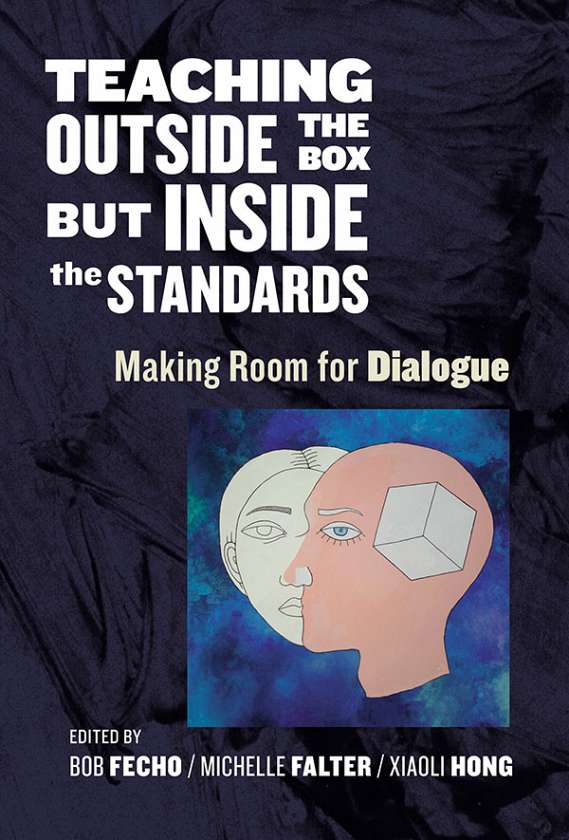 Teaching Outside the Box but Inside the Standards: Making room for dialogue
Teaching Outside the Box but Inside the Standards: Making room for dialogue
Authors: Fecho, Falter, Hong
Published: 2015
Publisher: Teachers College Press
Many educators feel caught between mandates to meet literacy standards and the desire to respond to individual students’ interests, skills, and challenges. This book demonstrates how a dialogical approach to practice will enable teachers to meet the needs of today’s diverse student population within a standardized curriculum. Chapters highlight the efforts of four high school teachers to create dialogical classroom space, documenting both the possibilities of and impediments to such an approach to teaching. Drawing on a theoretical framework and rationale for engaged dialogical practice, the authors present and analyze key classroom events that illustrate the productive and restrictive tensions for such work and suggest ways for teachers and schools to implement these ideas, especially for complementing and expanding the Common Core State Standards.
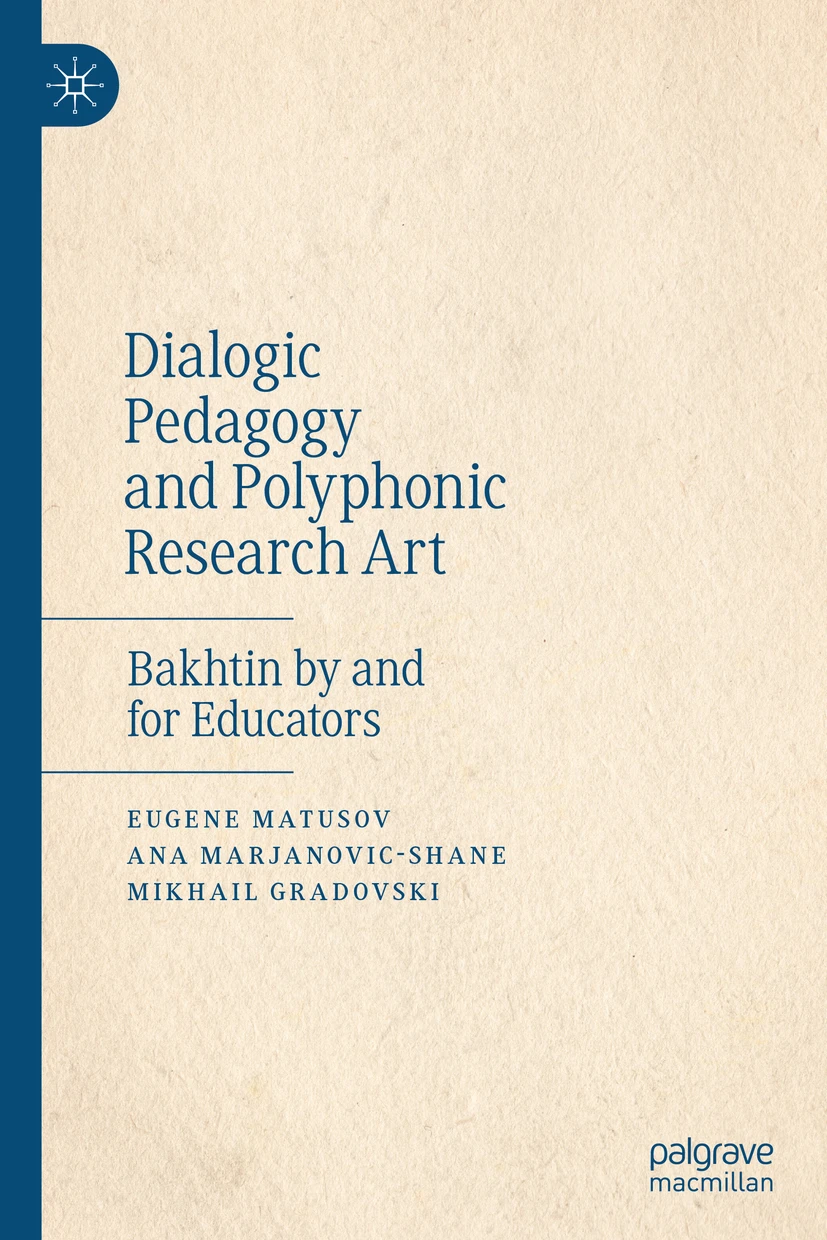 Dialogic pedagogy and polyphonic research art: Bakhtin by and for educators
Dialogic pedagogy and polyphonic research art: Bakhtin by and for educators
Authors: Eugene Matusov, University of Delaware, USA; Ana Marjanovic-Shane, Independent Scholar, USA; Mikhail Gradovski, University of Stavanger, Norway;
Published: 2019
Publisher: Palgrave Macmillan (Springer)
The electronic book is available from the publisher or from us.
The book presents diverse Bakhtinian dialogic pedagogies through a selection of unique teaching cases. Introduces a new paradigm of dialogic polyphonic research art in a critical dialogue about Bakhtinian pedagogy. Examines important issues of the Bakhtinian ethical dialogic framework, including ways diverse educators conceptualize being Bakhtinian, the importance of students’ ontological engagement, power relationships between teachers and students, and tensions between Bakhtinian educational philosophy and practice and conventional educational institutions.
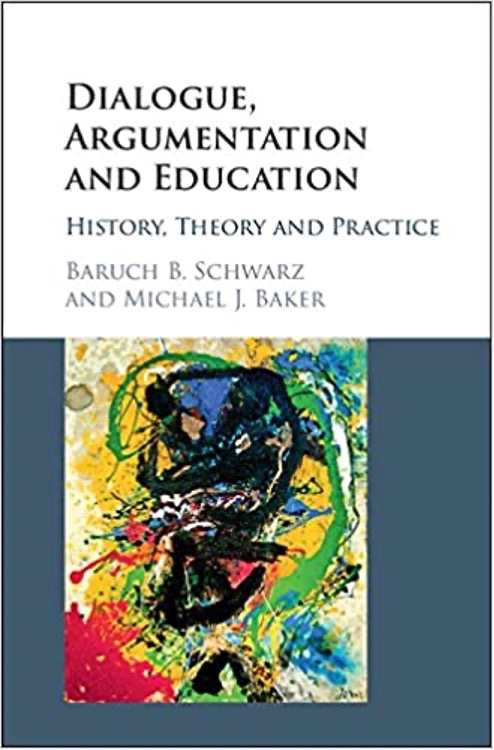 Dialogue, Argumentation, and Education
Dialogue, Argumentation, and Education
Authors: Baruch B. Schwarz, Hebrew University of Jerusalem and Michael J. Baker, Centre National de la Recherche Scientifique (CNRS), Paris
Publisher: Cambridge University Press
Online publication date: January 2017; Print publication year: 2016
Online ISBN:9 781316493960; DOI: https://doi.org/10.1017/9781316493960
New pedagogical visions and technological developments have brought argumentation to the fore of educational practice. Whereas students previously 'learned to 'argue', they now 'argue to learn': collaborative argumentation-based learning has become a popular and valuable pedagogical technique, across a variety of tasks and disciplines. Researchers have explored the conditions under which arguing to learn is successful, have described some of its learning potentials (such as for conceptual change and reflexive learning) and have developed Internet-based tools to support such learning. However, the further advancement of this field presently faces several problems, which the present book addresses. Three dimensions of analysis - historical, theoretical and empirical - are integrated throughout the book. Given the nature of its object of study - dialogue, interaction, argumentation, learning and teaching - the book is resolutely multidisciplinary, drawing on research on learning in educational and psychological sciences, as well as on philosophical and linguistic theories of dialogue and argumentation.
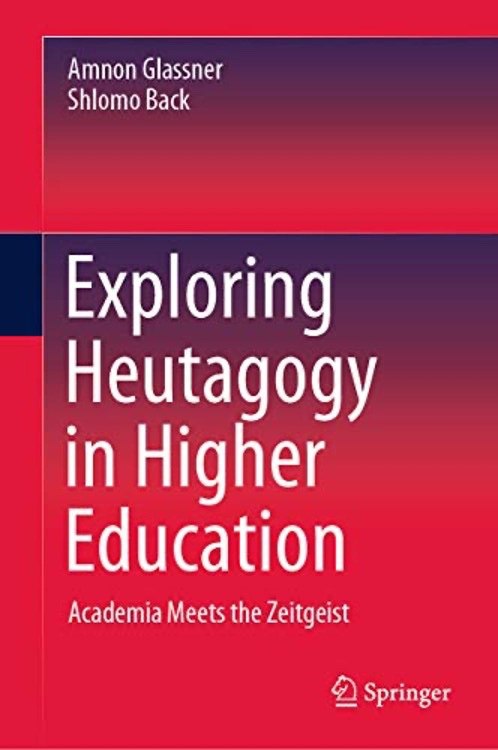 Exploring Heutagogy in Higher Education: Academia Meets the Zeitgeist
Exploring Heutagogy in Higher Education: Academia Meets the Zeitgeist
Authors: Amnon Glassner, Shlomo Back
Publisher: Springer
Provides a new approach to enhance self-determined learning.
Proposes a paradigm shift in teaching, learning, and the educational enterprise and ecosystems.
Caters to educators’ needs to modify the traditional ways of teaching and offer students more meaningful and fulfilling learning experiences
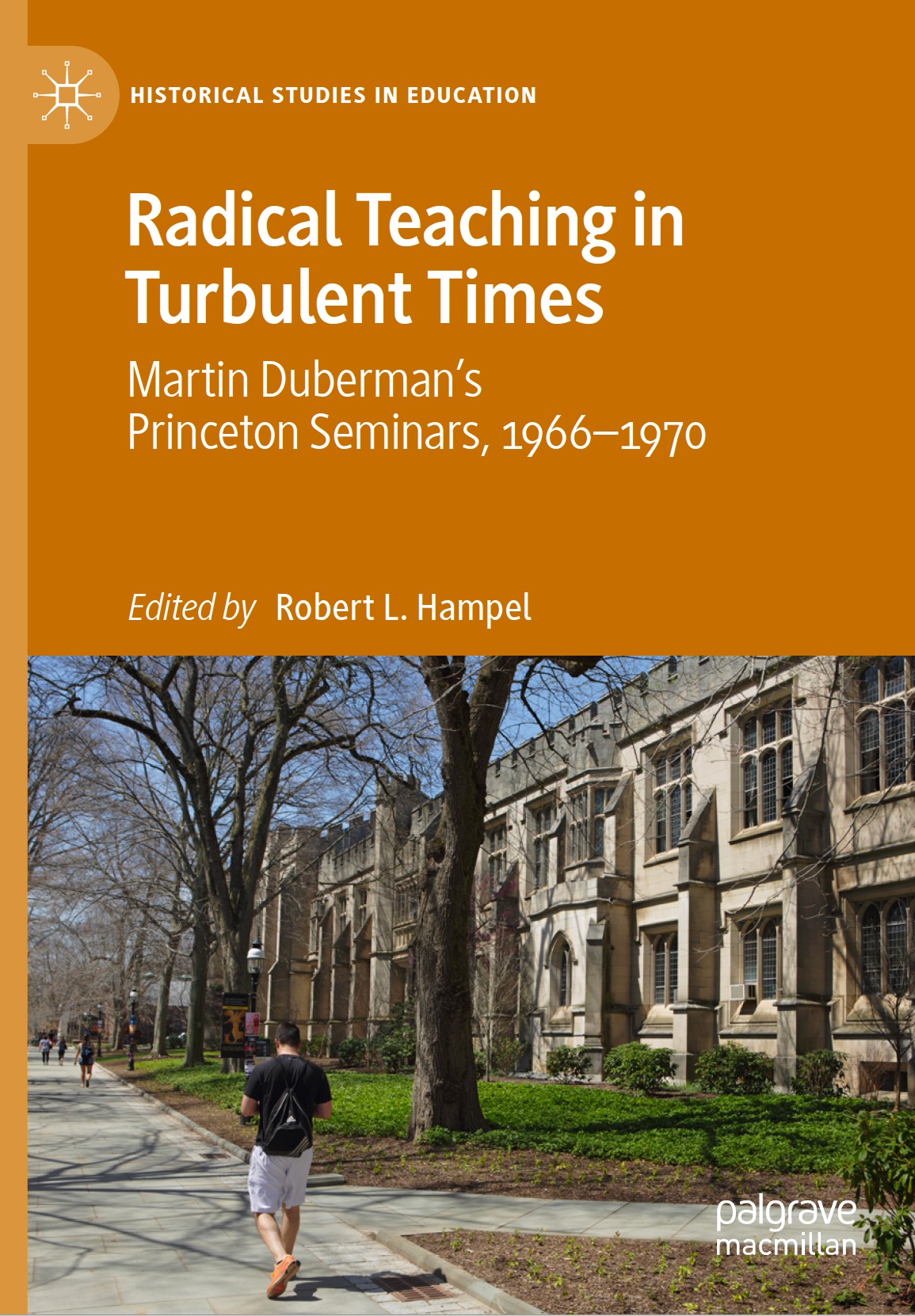 Radical Teaching in Turbulent Times: Martin Duberman’s Princeton Seminars, 1966–1970
Radical Teaching in Turbulent Times: Martin Duberman’s Princeton Seminars, 1966–1970
Edited by Robert L. Hampel
Publisher: Palgrave Macmillan, Cham
Copyright Year 2021
ISBN 978-3-030-77059-4
Language: English
From 1966 to 1970, historian Martin Duberman transformed his undergraduate Princeton seminar on American radicalism. This book looks closely at the seminar, drawing on interviews with former students and colleagues, conversations with Duberman, and abundant archival material in the Princeton archives and the Duberman Papers. The array of evidence makes the book a primer on how historians gather and interpret evidence while at the same time shining a light on the tumultuous late 1960s in American higher education. This book will become a tool for teaching, inspiring educators to rethink the ways in which history education is taught and teaching students how to reason historically through sources.
Robert L. Hampel is a Professor in the School of Education at the University of Delaware, USA. He is a historian of education who also studies contemporary education policy. Hampel has previously served as Secretary/Treasurer for the national History of Education society.
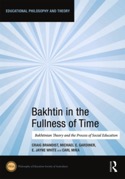 Bakhtin in the Fullness of Time: Bakhtinian Theory and the Process of Social Education
Bakhtin in the Fullness of Time: Bakhtinian Theory and the Process of Social Education
Edited by Craig Brandist, Michael E. Gardiner, E. Jayne White, Carl Mika
Publisher: Routhledge
Copyright Year 2020
This book takes the works of Mikhail Bakhtin as its inspiration in the contemplation of the potential of dialogic scholarship for philosophy of education. While Bakhtin’s work has been widely received in educational studies in recent years, the academic literature does not sufficiently convey the sophistication of his cultural-historical works.
Selected works on the limits and perspectives of Mikhail Bakhtin are presented in the book. In doing so, the contributors seek to interpret the work of the Bakhtin Circle in a complex contemporary world. Layering and drawing from the many ideas explored by the Circle during their collective lifetimes and those that influenced their work, each chapter offers a different dimension of thought concerning issues facing societies remote (or perhaps not so remote) from the world of post-revolutionary Russia.
In the post-2008 era, during which financial crises have morphed into global recession and which characterise growing social inequities, widespread political instabilities and further environmental decline and resource depletion, what is needed more than ever is a twenty-first century Bakhtin, one that is occupied with the distinct challenges our times present to all of us. The individual contributors to Bakhtin in the Fullness of Time aim to contribute to a revisioning and reassessment of Bakhtin, through a diverse series of engagements with both his legacy and future promise. In contemplating Bakhtin in the fullness of time, historical perspectives and contributions must be encountered in a contemporary understanding that will contribute to philosophy of education today.
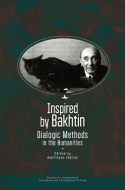 Inspired by Bakhtin: Dialogic Methods in the Humanities
Inspired by Bakhtin: Dialogic Methods in the Humanities
Edited By Matthias Freise, 2018 | Academic Studies Press
Copy Available: No
Language: English
ISBN: 9781618117380
A book in the Studies in Comparative Literature and Intellectual History Series. Series editor is Galin Tikhanov.
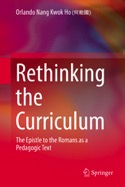 Rethinking the Curriculum - The epistle to the Romans as a pedagogic text
Rethinking the Curriculum - The epistle to the Romans as a pedagogic text
By Orlando Nang Kwok Ho, 2018 | Springer (external site)
Copy Available: Yes
Language: English
Edition: 1
Pages: 384
ISBN: 978-981-10-8901-5
- Addresses the real problems and learning and developmental needs of real people, real teachers, and real leaders
Enhances our understanding of the educational concepts, framework, content and the pedagogical tactfulness of Paul as a teacher and thinker on life, values, epistemic thoughts, secularity, and spirituality education - Clarifies the conceptual and meta-framework differences and similarities between Paul's first generation of Greco-Roman teachers and learners and our contemporary understanding of and assumptions about spirituality and secularity
- Equips readers to rethink and handle complex learning and teaching issues related to life, values and spirituality; and to rise above perplexing interpretative puzzles about The Epistle, when the text is resituated to its original intercultural, sociopolitical, and pedagogic contexts
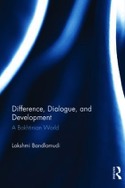 Difference, Dialogue, and Development
Difference, Dialogue, and Development
By Lakshmi Bandlamudi, 2016 | Routledge (external site)
Copy Available: No
Language: English
Edition: 1
Pages: 159
ISBN: 978-1-138-80592-7
The difference, Dialogue, and Development is an in-depth exploration of the collected works of Mikhail Bakhtin to find the relevance of key concepts of dialogism for understanding various aspects of human development. Taking the reality of differences in the world as a given, Bandlamudi argues that such a reality necessitates dialogue, and actively responding to that necessity leads to development. The varied works of Bakhtin that span several decades passing through the most tumultuous period in Russian history are brought under one banner of three D’s – Difference, Dialogue and Development – and the composite features of the three D’s emerge as leitmotifs in every chapter.
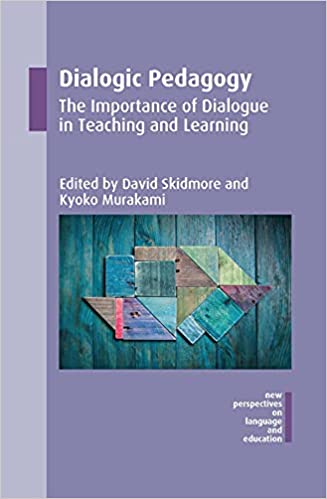 Dialogic Pedagogy: The importance of dialogue in teaching and learning
Dialogic Pedagogy: The importance of dialogue in teaching and learning
By David Skidmore, Kyoko Murakamy, 2016 | Multilingual Matters (external site)
Copy Available: No
Language: English
Pages: 256
ISBN: 978-1783096213
This book provides a wide-ranging and in-depth theoretical perspective on dialogue in teaching. It explores the philosophy of dialogism as a social theory of language and explains its importance in teaching and learning. Departing from the more traditional teacher-led mode of teacher–student communication, the dialogic approach is more egalitarian and focuses on the discourse exchange between the parties. Authors explore connections between dialogic pedagogy and sociocultural learning theory, and argue that dialogic interaction between teacher and learners is vital if instruction is to lead to cognitive development. The book also presents prosody as a critical resource for understanding between teachers and students, and includes some of the first empirical studies of speech prosody in classroom discourse.
 Thinking, Fast and Slow
Thinking, Fast and Slow
Author: Daniel Kahneman
Publication Date: 2011
Publisher: Farrar, Straus and Giroux
From the publisher: "In his mega bestseller, Thinking, Fast and Slow, Daniel Kahneman, world-famous psychologist and winner of the Nobel Prize in Economics, takes us on a groundbreaking tour of the mind and explains the two systems that drive the way we think. System 1 is fast, intuitive, and emotional; System 2 is slower, more deliberative, and more logical. The impact of overconfidence on corporate strategies, the difficulties of predicting what will make us happy in the future, the profoun...
 Dialogue and Boundary Learning
Dialogue and Boundary Learning
Author: Peter Neville Rule
Publication Date: 2015
Publisher: Sense Publishers
From the publisher: "This book explores dialogue and learning in theory, practice and praxis across a spectrum of lifelong education contexts. It develops a philosophical basis by examining the lives, works and dialogic traditions of four key thinkers: Socrates, Martin Buber, Mikhail Bakhtin and Paulo Freire. It then examines dialogue and learning in contexts ranging from early childhood development to adult, community and higher education."
